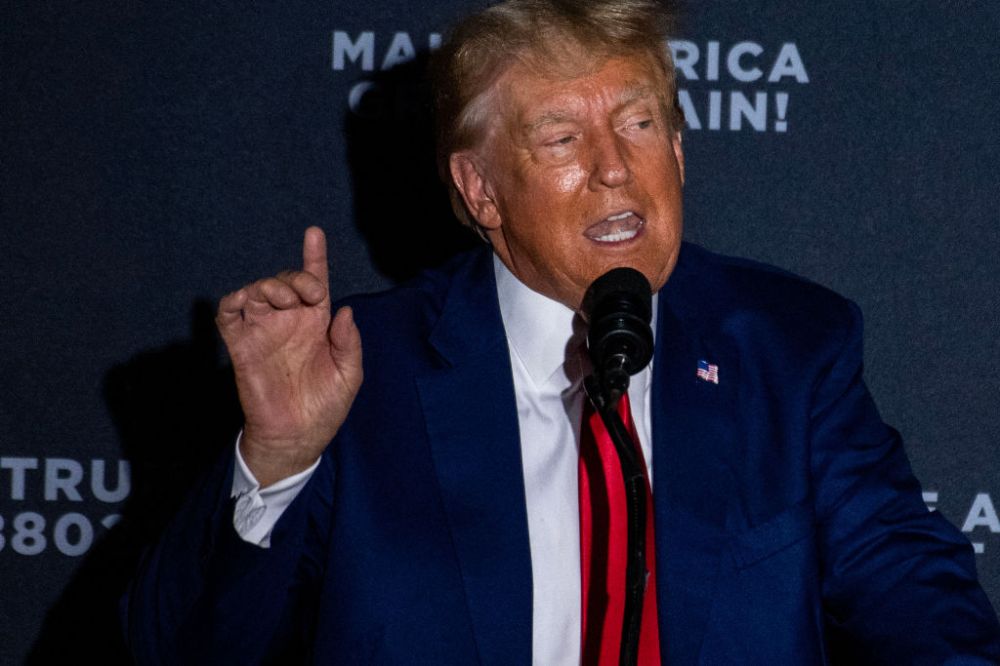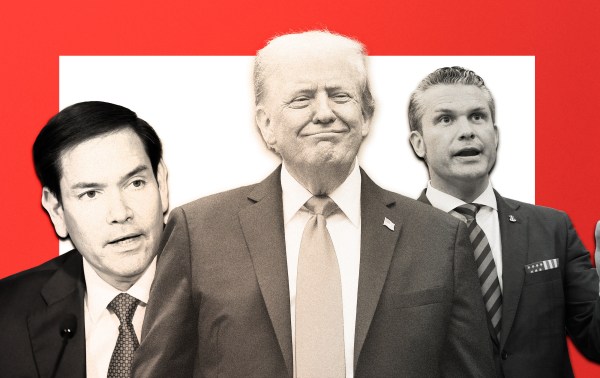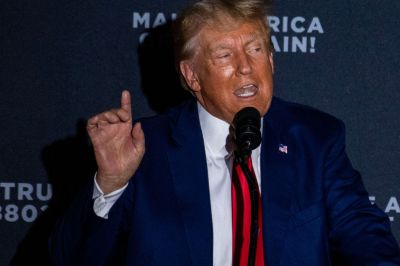Hey,
So I have only a couple hours to write this “news”letter before I head over to CNN for some pre-debate punditry. After that, I have to watch the debate and then do some post-debate commentary for Dispatch members.
But I really want to write about this idea making waves out there that the 14th Amendment prevents Trump from running again and that this prohibition is both self-executing and self-enforcing. I ain’t no lawyer, however, and, as I’ve written a bunch lately, I’m kind of sick of lawyers acting like a priestly caste these days. If you want to hear the best of such priestly incantations, I highly recommend the latest episode of Advisory Opinions.
So herewith a seemingly meandering elucidation of how I think about this stuff. Like Daniel LaRusso painting the fence and waxing-on and waxing-off Mr. Miyagi’s car, my argument will hopefully come together at the end as surprisingly on point. Or not. I meander, you decide.
During the Glorious Revolution, while fleeing England for France, King James II devised an ingenious scheme to thwart his usurpers, William of Orange and Mary II. James—Jimmy to his friends—threw the Great Seal of the Realm into the River Thames. His theory was that since the imprint of the seal was required for all official acts, including the paperwork for convening Parliament, the new would-be king and queen would be effectively powerless until Jimmy came back to retake the throne.
Logically, the theory had a lot going for it. Monarchs couldn’t meaningfully rule without the stamp. Deprive the usurpers of the seal, and it’d be like trying to steal a car without an ignition key.
It was a bit like one of my favorite scenes from the movie Diner. Steve Gutenberg—recently made a star by the Egg Council—played Eddie, a young man who wanted to marry a lovely lass named Elyse. But he had misgivings. Eddie found it difficult to talk with Elyse about anything. He could talk all night at the diner with his buddies, but couldn’t talk to his fiancée about anything for more than five minutes. So, he came up with a plan. She’d have to take a test about the Baltimore Colts. It was 140 questions—true or false, multiple choice, short essays. If she passed, the wedding was on. If she failed, well, Eddie explained, he’d call off the wedding. “It’s out of my hands.”
Of course, it wasn’t actually out of his hands. But he decided to outsource the decision to this other thing. Similarly, the Great Seal of the Realm wasn’t magic, it was a glorified rubber stamp. William and Mary just had another one made when they took power, in arguably the single most consequential and beneficial example of regime change in history. In other words, they hotwired the throne.
Trust but reify.
This mindset is very common to humans. We like to come up with abstract rules that constrain our options and force decisions that we don’t want to make, are afraid to make, or—most often—are afraid to take responsibility for.
By itself, this isn’t necessarily a bad thing. It’s an important part of civilizational evolution. Think of chess. You have to agree to the rules in order for the game to work. If one player can change the rules on the fly, it’s not chess anymore. It’s Calvinball with weird game pieces, or Dewey Oxburger’s poker, or Captain Kirk’s Fizzbin.
The Constitution is one of the greatest examples of rule-setting in human history. Because the Constitution feels old, a lot of people have lost the ability to appreciate its fundamentally radical nature. (They also fail to appreciate that against the timeline of human history, it still has that new car smell.)
Prior to the American founding, it was simply taken as a given that those in power got to make up the rules as they went. Oh, it wasn’t always expressed that way. Some monarchs liked to say they were beholden to God’s law, but since most monarchs were free to interpret God’s law—and will—as they saw fit, the rules nearly always took a backseat to the whims of rulers. Yes, occasionally, popes could tell a king or emperor, “You’ve gone too far,” like when Pope Gregory VII warned Henry IV, “Check yourself before you wreck yourself.” (I’m paraphrasing). But you get the point.
But the Founders pledged to hold themselves—and future generations—subservient to essentially a rulebook on how power could be used legitimately. The two-term limit for presidents wasn’t added to the Constitution until after Franklin Roosevelt opted to become president-for-life, but the republican spirit manifested in the Constitution was there from the beginning. When King George asked the American painter Benjamin West what then-Gen. George Washington would do now that the Revolution was over, West said Washington would resign and go back to private life. In Europe, the assumption of many was that Washington would—like Conan the Barbarian—simply become “king by his own hand.” If Washington gave up power voluntarily, King George reportedly said it would make him “the greatest man in the world.”
Washington’s decisions, first to relinquish military power and, later, political power after two terms, basically made America possible. Washington could have been president-for-life if he wanted. Heck he probably could have named himself king. Lots of countries can boast of having elections—once. The really important election is the second one, when power changes hands from one person to another and from one faction or party to another.
Commitment isn’t just an idea.
What to make of all this? Well, like a milking stool or a hamantaschen, there are three points.
Well, first of all, the American constitutional order depends on both democratic and republican virtue—a subject I just finished discussing with Robert P. George on an episode of The Remnant, which will be released Thursday morning. Democratic virtue is the willingness to accept the will of the majority, when lawfully expressed. Republican virtue involves a commitment to the mechanisms and institutions that, among other things, define what “lawfully expressed” means in practice.
For instance, let’s say a bunch of polls found that 99 percent of Americans wanted to seize the assets of the top 1 percent. So long as the rules are in effect, the assets of the top 1 percent would remain safe, at least for a while, because mere popular sentiment doesn’t determine anything even in a democratic republic. Congress would have to pass laws to seize that wealth. Even before that, assuming some current members of Congress didn’t want to pass such laws, elections would have to be held to get enough Jacobins and Bane disciples in power to pass those laws. After that, the president would have to sign such legislation. If he refused, more elections would be required to get a veto proof majority. And even then, the laws would have to be written in such a way that the courts didn’t thwart the Great Taking. If the courts rejected the effort, the Constitution might have to be amended. Or new judges would have to be appointed. Either way, such options would take time, debate, etc. And hopefully the idea would die before it made it into law.
This is all by design. Bad ideas are often popular, so having a laborious process for implementing them is a way to wait out the fever until people come to their senses. If the idea is good, proponents will win the debate over time, and possibly improve it along the way.
You don’t necessarily need every person to like or agree with the rules for this system to work, but you need enough of them to. This goes both for leaders—like Washington—but also normal Americans. All that’s required for the Constitution to become a dead letter is for a critical mass of leaders and/or citizens to simply turn their backs on it. This points to the importance of both commitment and civic virtue.
Human will matters. The Constitution, like the Great Seal of the Realm, is a meaningless object, absent the willingness of the people to imbue it with meaning.
The deus ex machina cult.
William Baude and Michael Stokes Paulsen have written an impressive law review article claiming that Donald Trump is ineligible to run for president again. Michael Luttig and Laurence Tribe have published their own version of the same argument. The gist is that Trump ran afoul of Section 3 of 14th Amendment, which says:
No person shall be a Senator or Representative in Congress, or elector of President and Vice-President, or hold any office, civil or military, under the United States, or under any State, who, having previously taken an oath, as a member of Congress, or as an officer of the United States, or as a member of any State legislature, or as an executive or judicial officer of any State, to support the Constitution of the United States, shall have engaged in insurrection or rebellion against the same, or given aid or comfort to the enemies thereof. But Congress may by a vote of two-thirds of each House, remove such disability.
Now, I won’t get into any of the legal, definitional, or constitutional arguments. But I think their arguments are plausible, if not wholly persuasive. At this point, readers know I think Trump disqualified himself for public office, regardless of any technical legal or constitutional arguments. Whether he’s an insurrectionist or lent aid and comfort to insurrectionists is a rich and worthwhile topic for debate.
But let’s stipulate that it’s true. The idea that this prohibition is self-enforcing—even if it’s self-executing—is nonsense. Just to clarify: A self-executing provision of the Constitution doesn’t require any further or accompanying legislative action to take effect, like age requirements for members of Congress. So in other words, Trump’s disqualification is immediate unless lifted.
And here’s the important part: It’s nonsense even if it’s true.
Every clause of the Constitution must be enforced, including the age requirements. And I don’t just mean by judges and justices. Again, not every person needs to agree, but you need enough people—both in power and among the population at large—to agree to follow the Constitution for it to work. This isn’t some pie-eyed statement of principle. It’s an observation.
For instance, Congress has ignored the provision requiring a declaration of war since World War II. The Supreme Court, the final (but not only!) arbiter of constitutionality, is never going to enforce that. There’s a colorable argument that paper money is unconstitutional. If you believe that, please send me all of your paper money. Executive agencies are barred from raising taxes, but some do it anyway. People serving in the military aren’t supposed to serve in Congress, and yet members of the reserves do it all the time. All revenue bills are supposed to start in the House, but the Senate keeps trying—and occasionally succeeding. And don’t even get me started on presidential executive orders. If it was proved while Barack Obama was president that he wasn’t born in America who, exactly, would then remove him from office because he was constitutionally barred from the presidency? If no one stood up to do it, and he didn’t resign. What then? The Constitution wouldn’t, like the Ark of the Covenant, start melting faces all on its own.
The point isn’t that there aren’t sound constitutional arguments going the other way on some or all of these things. The point is that the only way we end up being constrained by the Constitution is by people taking action to see that the Constitution—or their interpretation of it—is faithfully followed and enforced.
Let’s say pretty much everyone agrees with Baude and Paulsen. So what? Nothing will happen to keep Trump from running unless someone, somewhere, does something about it. I mean, does anyone think that if they sat Donald Trump down and explained Baude and Paulsen’s argument to him that it would matter to Trump in the slightest? He’d still run—even if he was convinced the argument was right. If Trump knew anything about George Washington, he wouldn’t even agree with King George. He’d think Washington was a sucker for abdicating power. Trump only plays Calvinball.
The question is, “Who will stop him?” Now, some say that state officials can keep him off the ballot based on this 14th Amendment theory. Okay. Let’s say they do that. Trump would obviously challenge that in court and it would go to the Supreme Court. Even though it would cause all sorts of ugly tumult, I’d be fine with the court upholding the decision, if the reasoning was sound. But what a mess that would be.
More importantly, enforcement isn’t even half the battle. Indeed, the need to enforce any constitutional provision can often be seen as a sign of failure. If everyone really believed in free speech, there would be very few free speech cases. Similarly, if Americans overwhelmingly subscribed to the spirit of the Constitution, it wouldn’t matter if Trump ran. He’d have disqualified himself in their eyes regardless of whether he technically violated the law. Hell, he would have been convicted in the second impeachment. If every Briton believed a king was powerless without the Great Seal, William and Mary would have been powerless.
The real guarantor of the Constitution is internal commitment to it, by leaders and “followers” alike. I don’t think that Trump would have effectuated a coup but for the honor of Mike Pence. But if Rudy Giuliani had been vice president, we’d have to rely on a lot of other people to have the courage and fortitude of Mike Pence to prevent such a coup.
Intellectuals love ideas and systems. Lawyers not only love them, they make a living off of them. So it’s not surprising that many lawyers and intellectuals gravitate to arguments that boil down to word magic. They want a silver bullet idea to solve problems that take things out of our hands—or the hands of voters. I’d love to live in a country where the average American simply agreed with Baude and Paulsen’s conclusions, not as a legal theory, but as common sense. In such a country, Trump would never have been elected in the first place. But that’s not the country we live in.
In the country we live in, now and forever, the Constitution limits people in power only because the people in power agree to its limits and because the rest of us enforce that agreement.







Please note that we at The Dispatch hold ourselves, our work, and our commenters to a higher standard than other places on the internet. We welcome comments that foster genuine debate or discussion—including comments critical of us or our work—but responses that include ad hominem attacks on fellow Dispatch members or are intended to stoke fear and anger may be moderated.
With your membership, you only have the ability to comment on The Morning Dispatch articles. Consider upgrading to join the conversation everywhere.